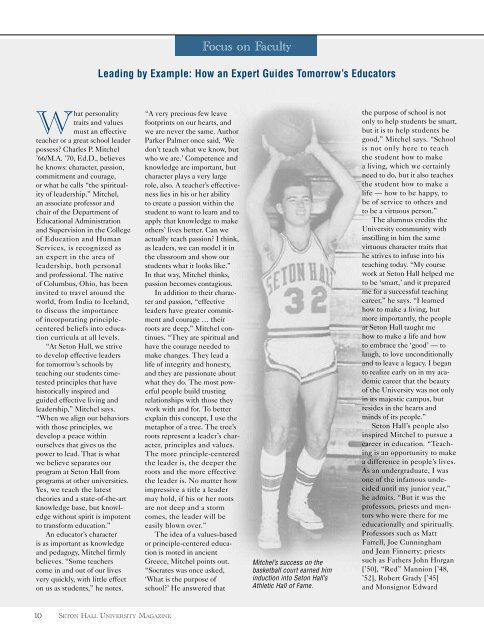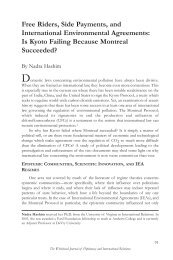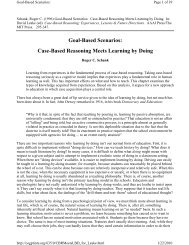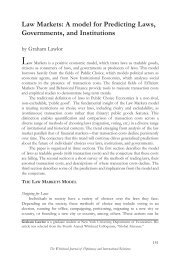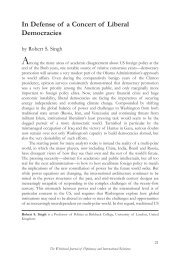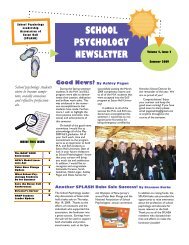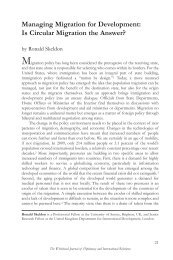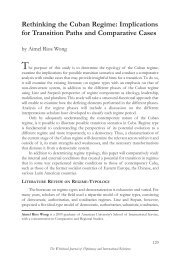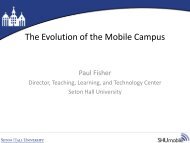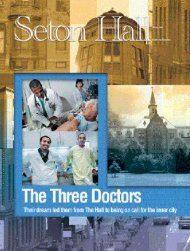Seton Hall Magazine, Summer 2001 - TLTC Blogs - Seton Hall ...
Seton Hall Magazine, Summer 2001 - TLTC Blogs - Seton Hall ...
Seton Hall Magazine, Summer 2001 - TLTC Blogs - Seton Hall ...
You also want an ePaper? Increase the reach of your titles
YUMPU automatically turns print PDFs into web optimized ePapers that Google loves.
What personality<br />
traits and values<br />
must an effective<br />
teacher or a great school leader<br />
possess? Charles P. Mitchel<br />
’66/M.A. ’70, Ed.D., believes<br />
he knows: character, passion,<br />
commitment and courage,<br />
or what he calls “the spirituality<br />
of leadership.” Mitchel,<br />
an associate professor and<br />
chair of the Department of<br />
Educational Administration<br />
and Supervision in the College<br />
of Education and Human<br />
Services, is recognized as<br />
an expert in the area of<br />
leadership, both personal<br />
and professional. The native<br />
of Columbus, Ohio, has been<br />
invited to travel around the<br />
world, from India to Iceland,<br />
to discuss the importance<br />
of incorporating principlecentered<br />
beliefs into education<br />
curricula at all levels.<br />
“At <strong>Seton</strong> <strong>Hall</strong>, we strive<br />
to develop effective leaders<br />
for tomorrow’s schools by<br />
teaching our students timetested<br />
principles that have<br />
historically inspired and<br />
guided effective living and<br />
leadership,” Mitchel says.<br />
“When we align our behaviors<br />
with those principles, we<br />
develop a peace within<br />
ourselves that gives us the<br />
power to lead. That is what<br />
we believe separates our<br />
program at <strong>Seton</strong> <strong>Hall</strong> from<br />
programs at other universities.<br />
Yes, we teach the latest<br />
theories and a state-of-the-art<br />
knowledge base, but knowledge<br />
without spirit is impotent<br />
to transform education.”<br />
An educator’s character<br />
is as important as knowledge<br />
and pedagogy, Mitchel firmly<br />
believes. “Some teachers<br />
come in and out of our lives<br />
very quickly, with little effect<br />
on us as students,” he notes.<br />
10 SETON HALL UNIVERSITY MAGAZINE<br />
Focus on Faculty<br />
Leading by Example: How an Expert Guides Tomorrow’s Educators<br />
“A very precious few leave<br />
footprints on our hearts, and<br />
we are never the same. Author<br />
Parker Palmer once said, ‘We<br />
don’t teach what we know, but<br />
who we are.’ Competence and<br />
knowledge are important, but<br />
character plays a very large<br />
role, also. A teacher’s effectiveness<br />
lies in his or her ability<br />
to create a passion within the<br />
student to want to learn and to<br />
apply that knowledge to make<br />
others’ lives better. Can we<br />
actually teach passion? I think,<br />
as leaders, we can model it in<br />
the classroom and show our<br />
students what it looks like.”<br />
In that way, Mitchel thinks,<br />
passion becomes contagious.<br />
In addition to their character<br />
and passion, “effective<br />
leaders have greater commitment<br />
and courage … their<br />
roots are deep,” Mitchel continues.<br />
“They are spiritual and<br />
have the courage needed to<br />
make changes. They lead a<br />
life of integrity and honesty,<br />
and they are passionate about<br />
what they do. The most powerful<br />
people build trusting<br />
relationships with those they<br />
work with and for. To better<br />
explain this concept, I use the<br />
metaphor of a tree. The tree’s<br />
roots represent a leader’s character,<br />
principles and values.<br />
The more principle-centered<br />
the leader is, the deeper the<br />
roots and the more effective<br />
the leader is. No matter how<br />
impressive a title a leader<br />
may hold, if his or her roots<br />
are not deep and a storm<br />
comes, the leader will be<br />
easily blown over.”<br />
The idea of a values-based<br />
or principle-centered education<br />
is rooted in ancient<br />
Greece, Mitchel points out.<br />
“Socrates was once asked,<br />
‘What is the purpose of<br />
school?’ He answered that<br />
Mitchel’s success on the<br />
basketball court earned him<br />
induction into <strong>Seton</strong> <strong>Hall</strong>’s<br />
Athletic <strong>Hall</strong> of Fame.<br />
the purpose of school is not<br />
only to help students be smart,<br />
but it is to help students be<br />
good,” Mitchel says. “School<br />
is not only here to teach<br />
the student how to make<br />
a living, which we certainly<br />
need to do, but it also teaches<br />
the student how to make a<br />
life — how to be happy, to<br />
be of service to others and<br />
to be a virtuous person.”<br />
The alumnus credits the<br />
University community with<br />
instilling in him the same<br />
virtuous character traits that<br />
he strives to infuse into his<br />
teaching today. “My course<br />
work at <strong>Seton</strong> <strong>Hall</strong> helped me<br />
to be ‘smart,’ and it prepared<br />
me for a successful teaching<br />
career,” he says. “I learned<br />
how to make a living, but<br />
more importantly, the people<br />
at <strong>Seton</strong> <strong>Hall</strong> taught me<br />
how to make a life and how<br />
to embrace the ‘good’ — to<br />
laugh, to love unconditionally<br />
and to leave a legacy. I began<br />
to realize early on in my academic<br />
career that the beauty<br />
of the University was not only<br />
in its majestic campus, but<br />
resides in the hearts and<br />
minds of its people.”<br />
<strong>Seton</strong> <strong>Hall</strong>’s people also<br />
inspired Mitchel to pursue a<br />
career in education. “Teaching<br />
is an opportunity to make<br />
a difference in people’s lives.<br />
As an undergraduate, I was<br />
one of the infamous undecided<br />
until my junior year,”<br />
he admits. “But it was the<br />
professors, priests and mentors<br />
who were there for me<br />
educationally and spiritually.<br />
Professors such as Matt<br />
Farrell, Joe Cunningham<br />
and Jean Finnerty; priests<br />
such as Fathers John Horgan<br />
[’50], “Red” Mannion [’48,<br />
’52], Robert Grady [’45]<br />
and Monsignor Edward


